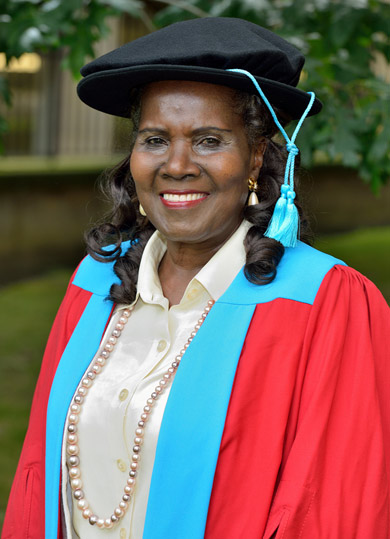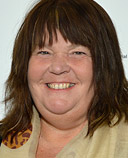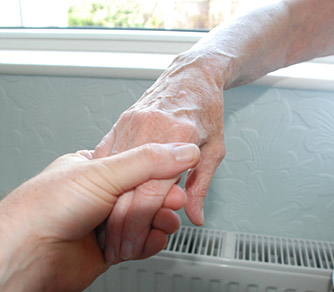Audrey collects her PhD and now looks to her next project

Tue, 22 Jul 2014 11:24:00 BST
Dr Audrey Robinson-Maynard’s new project is a “shared care” business that would mean older people having more say over their care
 SHE might have reached her seventies and had a long, successful and varied career in nursing, social work and community projects, but there was no way that Audrey Robinson-Maynard would settle for a quiet and easy retirement. Instead, she embarked on highly-detailed, globally-ranging research into the burgeoning field of social marketing. It has earned a PhD at the University of Huddersfield. Now she is considering a new project that could lead to innovation in the care home sector.
SHE might have reached her seventies and had a long, successful and varied career in nursing, social work and community projects, but there was no way that Audrey Robinson-Maynard would settle for a quiet and easy retirement. Instead, she embarked on highly-detailed, globally-ranging research into the burgeoning field of social marketing. It has earned a PhD at the University of Huddersfield. Now she is considering a new project that could lead to innovation in the care home sector.
Her doctorate was conferred, during the latest round of University of Huddersfield graduation ceremonies, in recognition of research that provides social marketers with a series of benchmarks to aid the success of their campaigns in fields, such as health education and environmental awareness.
 In addition to her thesis, Dr Robinson-Maynard – who was supervised by Dr Julia Meaton (pictured right), a Senior Lecturer in the University of Huddersfield’s Business School – has also presented papers dealing with her findings – one was delivered in Australia – and has contributed a chapter to the new book Contemporary Issues in Social Marketing (pictured).
In addition to her thesis, Dr Robinson-Maynard – who was supervised by Dr Julia Meaton (pictured right), a Senior Lecturer in the University of Huddersfield’s Business School – has also presented papers dealing with her findings – one was delivered in Australia – and has contributed a chapter to the new book Contemporary Issues in Social Marketing (pictured).
Social marketing benchmarks
Originating over 40 years ago, social marketing aims to develop campaigns which persuade people that if they change their behaviour – by quitting smoking, for example – then they will gain from it personally. Dr Robinson-Maynard contrasts this with legislation that attempts to enforce behaviour.
“With social marketing you are getting people to change their behaviour on a voluntary basis. We are not saying ‘you have to do this because the law says so’, but that it is better for you because these are the benefits that you will derive.”
In order to research the effectiveness of social marketing, Dr Robinson-Maynard examined 100 campaigns that had been conducted in countries and regions around the world, including Canada, Australia, America and Europe. Examples included a cot death prevention campaign in Canada and an anti-bullying strategy in Sweden. There were also more specialised examples of social marketing, such as a sustainable community planning drive in Panama.
Dr Robinson-Maynard used detailed qualitative and quantitative analysis in order to discover the factors that led to success in social marketing. Out of 19 benchmarks, she arrived at four that are statistically proven to be the most useful.
Social marketers must fully understand their target groups – either individuals or groups of people – and must show that there are clear benefits from behavioural change. Also, sustained support must be provided so that the target group receives assistance in changing its behaviour. And before embarking on a social marketing campaign, it is important to conduct a pilot exercise.
 Shared care – older people having more say over their care
Shared care – older people having more say over their care
Dr Robinson-Maynard’s PhD is the latest addition to qualifications she has obtained during a career that began when she came to the North of England from Jamaica in 1959, in order to train as a nurse. After an interlude running her own hair and beauty business in Huddersfield, she moved into social work – gaining a Huddersfield BA degree in Social Welfare Administration, later complemented by an MSc at London Guildhall University in Care Policy and Management.
She relocated to London to boost her career and achieved success at Brent Council, moving up the ladder to become Divisional Manager for Children's Assessment Services in a borough that presented many challenges to social workers. When she retired from that post, Dr Robinson-Maynard – who has five children – moved back to Huddersfield, where, in addition to her hair and beauty business, she had been involved in voluntary work.
“I like people to have some involvement, and to empower them. That is how you get the best out of them,” she says. This philosophy is at the heart of a new project she is considering – a “shared care” business that would mean older people having more say over their care. It is sector that is badly in need of improvement, says Dr Robinson-Maynard.







